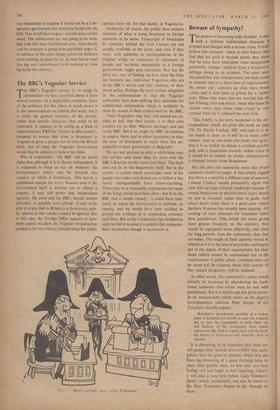Beware of Sympathy?
THE pattern is becoming sadly familiar. A man with a hitherto unblemished character is arrested and charged with a serious crime. Friends believe him innocent : when, to their horror, they find that his guilt is beyond doubt, they plead that he must have undergone some inexplicable personality change—suffered from a brainstorm. . perhaps owing to an accident. The court takes this possibility into consideration, but feels bound to sentence him to a short term of imprisonment. He comes out : commits an even more brutal crime; and is sent back to prison for a further term. Those who knew him are worried that the law is being cruel and unjust : those who knew his victims worry only about what crimes he may commit when he is released the next time.
This, briefly. is the story recounted in the cor- respondence which we print this week on page 350. To Martin Lindsay, MP, who sent it to us, the moral is clear; so it will be to many other readers. And on one point everybody can agree : that it is as foolish to release a criminal psycho- path with a disposition towards violent crime as it would be to release, in similar circumstances. a criminal lunatic from Broadmoor.
' But this does not necessarily mean that prison sentences should be longer. It may simply suggest that there is a need for a different type of sentence. Colonel Lindsay would presumably agree that men who develop criminal tendencies bccause of mental breakdown or physical brain injury should be sent to hospitals rather than to gaols. And where doubt exists there is a good case—which Barbara Wootton has recently been arguing—for sending all such criminals for treatment rather than punishment. This would not mean giving them greater freedom; on the contrary, they would be segregated more effectively, and often for long periods, from the community than they are today. The length of their captivity would be related, as it is in the case of psychotics and lepers, not to the degree of their responsibility for their deeds (which cannot be ascertained) but to the requirements of public safety. Criminals who can be cured will be released; those who cannot—if they remain dangerous—will be retained.
In other words, the community's safety would actually be increased by abandoning the tradi- tional insistence that crime must be met with punishment. But it is hard to get this point across. In an unexpectedly subtle satire on his paper's correspondence columns, Peter Simple, of the Telegraph, recently argued :
Retributive punishment, possibly of a violent kind, is designed not merely to cure the criminal but to cure the community as well. Once the evil feelings of the community have found expression, the slate is wiped clean and the heal- ing forces of forgiveness will naturally start to operate.
It is disturbing to be reminded that there are still people (they include several MPs) who really believe that the glow of pleasure which, they get from day-dreaming of a good birching helps to clean their grubby slate, so that they can stop feeling evil and begin to feel forgiving. Clearly it will take a long time before Lady Wootton's thesis—which, incidentally, can also be found in the New Testament—begins to get through to them.










































 Previous page
Previous page